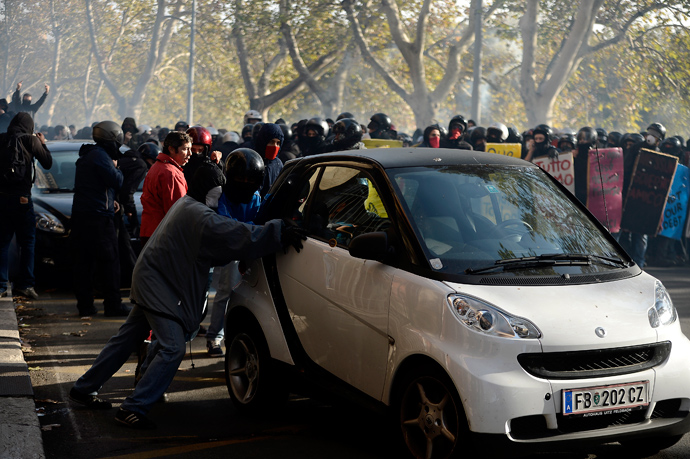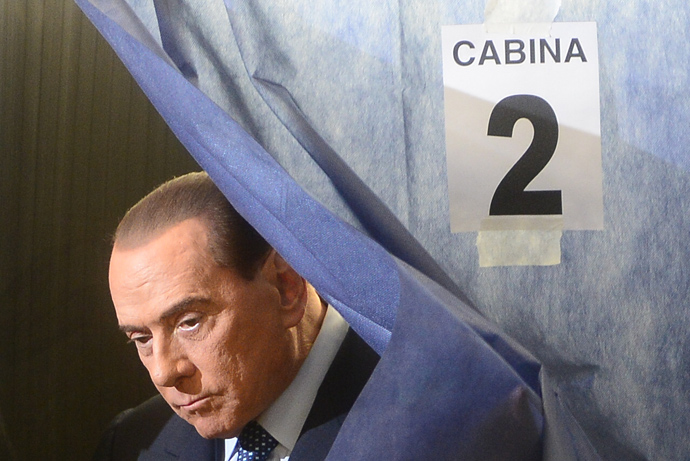‘Italy is running into a brick wall and the EU is going with it’
Italy is looking to escape its election stalemate, after a hung parliament raised fears of fresh financial turmoil. Investment adviser Patrick Young told RT that Italy and the EU are headed straight for a brick wall.
While the country’s election has provided more questions than
answers, one thing remains clear – Italian voters don’t want
austerity.
“Fifty-seven percent of Italians don’t like the idea of
austerity and they don’t want to do the sorts of things that the
European Union wants imposed upon them. That’s causing a huge
problem,” Young said.
He says the political limbo has left Italy with a deep sense of
uncertainty.
“There is no clear outright winner, there is no clear
government…they simply don’t know whether Italy is going to be a
reliable member of the Eurozone. And if Italy is not going to be a
reliable member of the Eurozone then there is probably not going to
be a Eurozone,” he told RT.
Young spoke to RT about the wider impact of Italy’s economic and
political struggles.
RT: What will happen to the Eurozone if the parties can't
find a way out of the deadlock and uncertainty remains if there's
another election?

Patrick Young: The Euro crisis – the elephant in the room
that nobody was talking about so far this year - is back…and it is
back big time. Because ultimately 57 per ent of Italians don’t like
the idea of austerity and they don’t really want to do the sorts of
things that the European Union wants imposed upon them. That’s
causing us a huge problem.
Because ultimately you have got incredible new parties, like Beppe Grillo’s Five-Star Movement; you’ve got an incredible wave of support that came back for Mr. Berlusconi, the former PM, and of course now it leads to the worst possible political limbo. There is no clear outright winner, there is no clear government, it is going to take weeks and ultimately markets despise the idea of uncertainty.
What they are looking at now is an awful uncertainty, because
they simply don’t know whether Italy is going to be a reliable
member of the Eurozone. And if Italy is not going to be a reliable
member of the Eurozone then there probably is not going to be a
Eurozone.
RT: Italy has operated on shaky coalitions since the end of World War Two - why should another one be any more problematic?
PY: I think the difficulty right now, and you are absolutely correct, - there have been multiple coalitions in Italian history since the end of WWII. But as for this moment, the divisions between the politicians are huge.You’ve got essentially Mr. Berlusconi, Mr. Grillo. They absolutely cannot abide each other. I mean, Grillo himself is ultimately the anti-Berlusconi candidate.And at the same time we’ve got [Pier Luigi] Bersani, who just edged victory in the lower house of parliament by three of four tenths of a percentage point for Mr. Berlusconi; who has got a soft-left in Italian terms reasonably hard-left compared to the United States of America mandate…but very shaky one…to move forward.And ultimately also a part of this you’ve got finally the blew-in Mr. Monti, technocrat, who the first time he went to the polls was essentially a huge failure with barely nine percent of the vote. These people are not the sort of people who are going to manage to get together instantaneously and get to agree a deal. Their differences are vast and that’s what is spooking the markets.
RT: One thing's clear: Italian voters don't want austerity. President Napolitano says it means 'the bell is ringing for Europe as well'. Will Europe listen?
PY:This is an incredible problem, because ultimately the dolce vita cannot be paid for under the current economics of the Italian system.
Of course we’ve had a number of politicians who have spent the whole of the last 50 or 60 years in frankly all of Western Europe telling people that government would ultimately be the answer to all of their problems.
That era is over.

We are looking at the era of smaller government, smaller debt, and actually a great deal more capitalism rather than government activity. Italy is running into a brick wall and the EU with it. How is the EU going to react?Well, ultimately, I think it’s difficult to see how German pensioners who are already seeing their libraries being closed in order to subsidize places like Greece - those people, the Germans who worked incredibly hard, the Dutch, they are reluctant to want to go further and subsidize the dolce vita.
RT: Italy has the second-highest proportionate debt - at 127 percent. How big is the danger it'll follow Greece into severe debt crisis?
PY: We have to bear in mind the fact that actually day-to-day the Italian government is not in the dire straits of the Greek government. The good thing about Italy is that they pretty much cover their bills on a day-to-day basis.The problem is that this dear old dolce vita factor dating back 50- 60 years of shaky coalitions that essentially did not want to bite the bullet has led the Italian to have a huge debt mountain. So already there is 110-120 percent of GDP to put it in perspective that’s not anywhere near a 150 – 160 per cent that you have got in Greece, at least.But on the other hand if you compare even to, let’s say, the United States of America which has been rather profligate for quite some time. They are barely reaching 100 percent of GDP, in other words a year of economic output. A great many nations one would argue should be under around 60 percent.So, Italy’s problem therefore is that they need to keep selling this debt. And what we have already seen in international money markets is that as soon as the Italians came out this week and said ‘We’d like to sell few more bounds in order to pay a few more pensions and cover a few more hospitals, etc.’ The money markets turn round and said ‘Well it’s going to cost you because we don’t trust your government.’That is where the problem lies. It’s not a short fuse like Greece, which is essentially a bankrupt nation. It is a longer fuse. If the Italians cannot keep sustaining the debt they already have, then they have fundamental problems. And unfortunately with a coalition that’s essentially a coalition from hell, looking at the negotiations that are now being put together by the president, it’s going to be very difficult for Italy to sustain itself in the Eurozone but there is some time.
All is not yet lost.
The statements, views and opinions expressed in this column are solely those of the author and do not necessarily represent those of RT.












